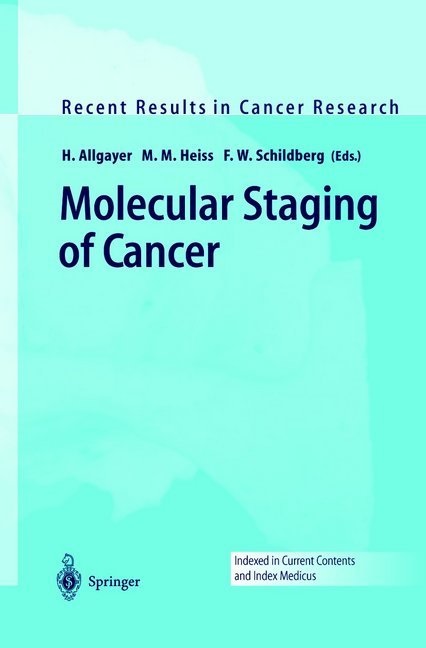Ulteriori informazioni
An explosion of information has occurred since scientists began to define the molecular events that describe the malignant transformation and progression of cells and their development towards a life-threatening metastatic disease. The First International Congress on Molecular Staging of Cancer, held in Munich in December 2001, aimed to establish an international platform of exchange among molecular biologists, cell biologists, tumor immunologists, and clinical and surgical oncologists. This network approach should be fruitful for both clinicians and researchers. The highlighted topics included tumor-associated proteolysis, minimal residual disease, new approaches for molecular diagnosis and targeting, and the first molecular staging models. One session focused on technology transfer, opening up a new field of funding for innovative concepts. Finally, the impact of molecular staging on clinical strategies was discussed.
Sommario
1 Reviews.- The Urokinase Receptor (uPAR, CD87) as a Target for Tumor Therapy: uPA-Silica Particles (SP-uPA) as a New Tool for Assessing Synthetic Peptides to Interfere with uPA/uPA-Receptor Interaction.- Molecular Regulation of Urokinase-Receptor Gene Expression as One Potential Concept for Molecular Staging and Therapy.- Stromal Cell Involvement in Cancer.- Inhibition of the Tumor-Associated Urokinase-Type Plasminogen Activation System: Effects of High-Level Synthesis of Soluble Urokinase Receptor in Ovarian and Breast Cancer Cells In Vitro and In Vivo.- Molecular Mechanisms of Carcinogenesis in Gastric Cancer.- Clinical Implications of Molecular Diagnosis in Hereditary Nonpolyposis Colorectal Cancer.- Minimal Residual Disease in Gastric Cancer.- Minimal Residual Disease in Breast Cancer and Gynecological Malignancies: Phenotype and Clinical Relevance.- Advanced Statistical Methods for the Definition of New Staging Models.- Clinical Implications of the EGF Receptor/Ligand System for Tumor Progression and Survival in Gastrointestinal Carcinomas: Evidence for New Therapeutic Options.- 2 Original Papers.- Minimal Residual Disease in Bone Marrow and Peripheral Blood of Patients with Metastatic Breast Cancer.- Estrogen Receptor Expression Profile of Disseminated Epithelial Tumor Cells in Bone Marrow of Breast Cancer Patients.- Detection of Circulating Tumor Cells in Blood Using an Optimized Density Gradient Centrifugation.- Antitumoral and Antimetastatic Effects of Continuous Particle-Mediated Cytokine Gene Therapy.- Genetic Subtyping of Renal Cell Carcinoma by Comparative Genomic Hybridization.- Telomere Length and hTERT Expression in Patients with Colorectal Carcinoma.- Estimation of Concentration of Chosen Adhesive Factors in Suprarenal Tumours of "Incidentaloma"Type.- Evaluation of the Levels of bFGF, VEGF, sICAM-1, and sVCAM-1 in Serum of Patients with Thyroid Cancer.- Molecular Whole-Body Cancer Staging Using Positron Emission Tomography: Consequences for Therapeutic Management and Metabolic Radiation Treatment Planning.- Recurrences of Thyroid Cancer After Radical Surgery and Complementary Treatment: Are Macroscopic, Microscopic, Scintigraphic, and Biochemical Criteria Sufficient in the Evaluation of Radicality of Primary Treatment?.- 3 Summary.- Summary and Congress Report: Molecular Staging of Cancer - Concepts of Today, Therapies of Tomorrow.
Riassunto
An explosion of information has occurred since scientists began to define the molecular events that describe the malignant transformation and progression of cells and their development towards a life-threatening metastatic disease. The First International Congress on Molecular Staging of Cancer, held in Munich in December 2001, aimed to establish an international platform of exchange among molecular biologists, cell biologists, tumor immunologists, and clinical and surgical oncologists. This network approach should be fruitful for both clinicians and researchers. The highlighted topics included tumor-associated proteolysis, minimal residual disease, new approaches for molecular diagnosis and targeting, and the first molecular staging models. One session focused on technology transfer, opening up a new field of funding for innovative concepts. Finally, the impact of molecular staging on clinical strategies was discussed.

